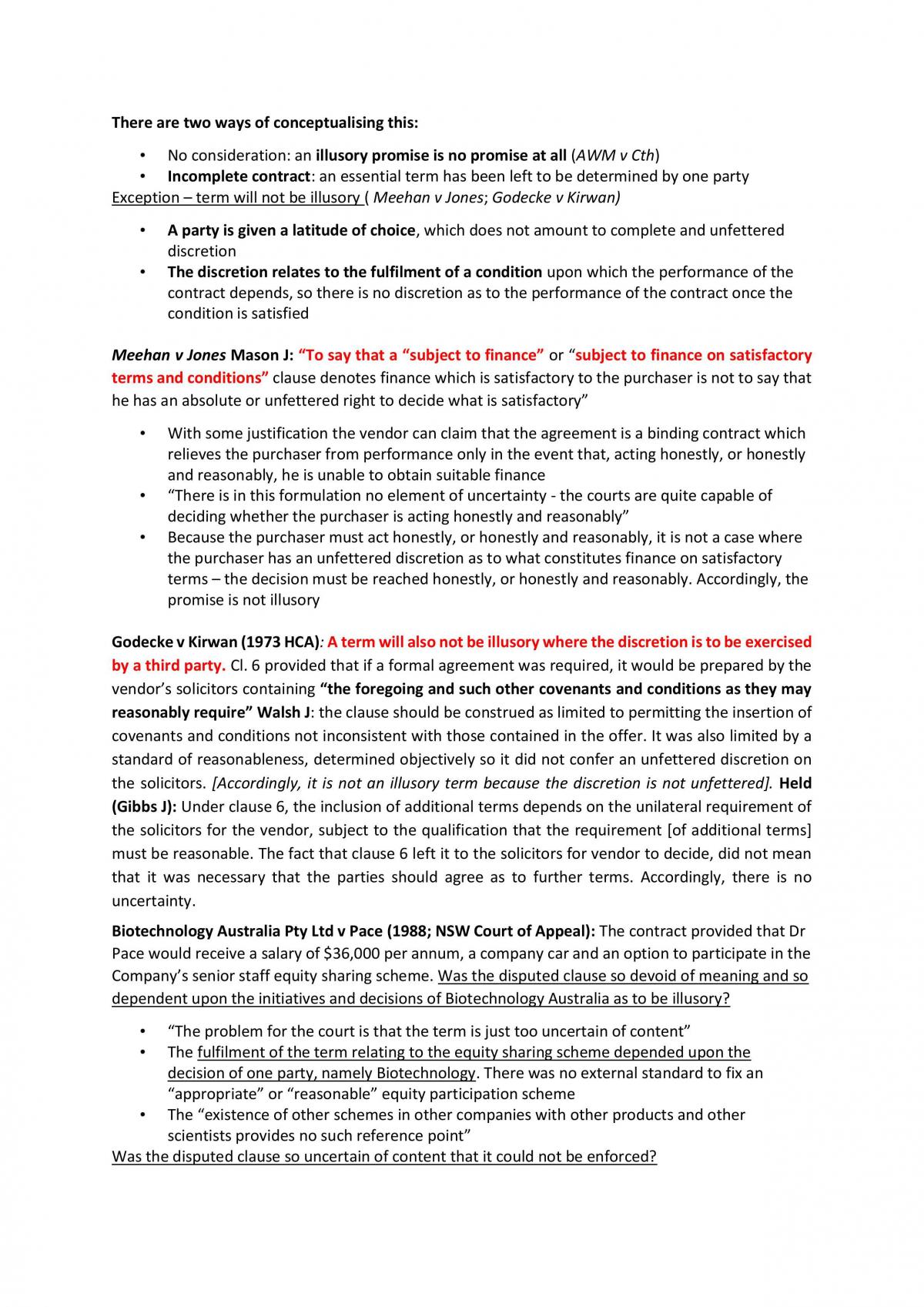Find
Search for over 200,000 study notes and past assignments!
Swap
Download study resources by swapping your own or buying Exchange Credits.
Study
Study from your library anywhere, anytime.
2 Found helpful • 48 Pages • Complete Study Notes • Year: Pre-2021
Principles of contract law notes includes cases of contracts and covers topics of agreement (offer and acceptance), consideration, intention, certainty, formalities and capacity. Agreement – Offer Definition: An offer is an indication from one person to another of his or her willingness to enter into a contract with that person subject to specific terms (Carter, Pedan & Tollhurst). The manifestation of willingness to enter into a bargain, so made as to justify another person in understanding that his assent to that bargain is invited’. (American Law Institute, 2nd Restatement of Contracts). Agreement requires Offer and Acceptance An offer – • Must be clear and certain - • Must be able to distinguish between - o statement of intention o invitation to treat Nature of Offer - To whom can an offer be made? • Must be made to another/others • Can be to individual, group of people or the public/world at large Offeror = person who makes the offer Offeree = person to whom the offer is made (i.e. who may accept or reject the offer) Types of contract: bilateral v unilateral contracts Bilateral (Multilateral) Contract - 2 (or more) parties to the contract (“A” and “B”) • Under Bilateral Contracts each party gives at least one promise in return for the other party’s promise(s) (A promises to pay B $100 to wash his car; in return, B promises to wash A’s car for $100) • Both A and B’s promises are executory - to be performed at some point after the contract is formed Unilateral Contract - 2 parties to the contract (“A” and “B”) – if contracts • Only one of the parties makes a promise (e.g., A promises to pay $100 to B if B washes his car). It is a promise in return for an act (Woollen Mills P/L v CTH) • B accepts A’s offer by performing the stipulated task • Contract is formed at time B performs his/her obligation in accordance with promise • B’s obligation has been executed; A’s promise remains executory TERMINATION / REVOCATION Agreement – Acceptance Definition: Unqualified assent to terms of offer. Acceptance brings about ad idem (meeting of the minds) • Method of acceptance can be stipulated by the offeror • Acceptance must be communicated to the offeror • Acceptance becomes effective when communication is received by the offeror Exceptions • Parties have had regular past dealing • Industry custom • Unilateral contracts – offeror waives need for communication • Method of acceptance provided eg. the Postal Rule CONSIDERATION (each party must give something in return for the other’s promise) Definitions: “A consideration is a detriment or liability voluntarily incurred by the promisee . . . or a benefit conferred on the promisor at the instance of the promisee . . . in exchange for the promise” (Jenks, The History of the Doctrine of Consideration in English Law) “The price paid for which the promise of the other is bought” (Pollok on Contracts) INTENTION Intention to enter contractual/legal relations • Some cases, it is difficult to distinguish between consideration and intention — however is distinct material element; (Atco Controls) • Intention determined objectively: can consider subject matter of agreement, status of parties, other surrounding circumstances; (Ermogernous) • Circumstances suggesting intention include: importance of subject matter, comprehensiveness of documents involved, time and committed involved, businesslike context, significance of fees and costs paid, parties at arms length; (Shahid) • Subjective intention may be relevant; (Air Great Lakes v KS Easter). Awareness of subjective - intention (however) will prevent contract being formed Air Great Lakes v Easter (non binding draft signed) • Parties to an agreement must manifest an intention to create legal relations in order for there to be a binding contract. • It is important to recognise that the factual circumstances of a situation used to determine whether there is contractual “intention” between the parties, may also be used to determine whether other material elements of the alleged contract exist (i.e., the same facts presented in a scenario may be relevant in considering whether there is “agreement”, “consideration” or “certainty” in the contract). CERTAINTY 1. Completeness: • A “reasonable price” will be implied for goods; (Goods Act 1958 (Vic), s 13) • Look at the nature of the contract and the circumstances; (ANZ v Frost Holdings Pty Ltd) • Courts won’t fill in gaps where transaction is very complex; (Milne v Attorney-General (Tas)) • Agree to agree: if parties agree to defer judgement on essential term, contract is unenforceable; (May and Butcher v The King) Exceptions: • Partial performance; Courts are less likely to find an agreement incomplete if it has been wholly or partly performed (Foley v Classique Coaches) • Effective mechanisms provided; (George v Roach; Goods Act 1958 (Vic), s 14) 2. Certainty of meaning: • Narrow/pedantic approach should be avoided; some ambiguity is acceptable (Upper Hunter Council v Australian Chilling & Freezing Co) • Must show ascertainable term(s) that are in common use; (Whitlock v Brew) • If term for price or value, must show external standard to fix it; (Hall v Bust; Biotech v Pace) • Express terms to “negotiate in good faith” or “mediate” must be sufficiently certain; (Coal Cliff Collieries; Aiton Australia). Obligation to negotiate, “inherently repugnant”; (Walford Miles). If parties have formally agreed to negotiate in good faith, law should make every effort to uphold; (United Group Services Rail Ltd v Rail Corporation (NSW)) • Uncertainty of meaning is more likely to affect validity if the parties have yet to perform 3. Terms cannot be illusory: • If promisor has unfettered discretion in performance of promise, no contract; (Placer Developments Ltd v Cth; Biotech v Pace) • Exception; (Meehan v Jones, see Gibbs CJ and Mason J; Godecke v Kirwan) • Arguments that contract void because terms are “incomplete”, “uncertain” or “illusory” are not mutually exclusive; (Biotech v Pace) FORMALITIES CAPACITY
This document is 25 Exchange Credits
More about this document:
|
|
This document has been hand checkedEvery document on Thinkswap has been carefully hand checked to make sure it's correctly described and categorised. No more browsing through piles of irrelevant study resources. |
|
|
This is a Complete Set of Study NotesComplete Study Notes typically cover at least half a semester’s content or several topics in greater depth. They are typically greater than 20 pages in length and go into more detail when covering topics. |
|
|
What are Exchange Credits?Exchange Credits represent the worth of each document on Thinkswap. In exchange for uploading documents you will receive Exchange Credits. These credits can then be used to download other documents for free. |
|
|
Satisfaction GuaranteeWe want you to be satisfied with your learning, that’s why all documents on Thinkswap are covered by our Satisfaction Guarantee. If a document is not of an acceptable quality or the document was incorrectly described or categorised, we will provide a full refund of Exchange Credits so that you can get another document. For more information please read Thinkswap's Satisfaction Guarantee. |

Studying with Academic Integrity
Studying from past student work is an amazing way to learn and research, however you must always act with academic integrity.
This document is the prior work of another student. Thinkswap has partnered with Turnitin to ensure students cannot copy directly from our resources. Understand how to responsibly use this work by visiting ‘Using Thinkswap resources correctly’.
Browse Monash Subjects




